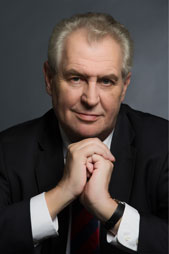Miloš Zeman
 Personal pages of the President of the Czech Republic
Personal pages of the President of the Czech Republic
Czech politician and President of the Czech Republic
Miloš Zeman was born on 28 September 1944. His father worked as a postal clerk and his mother was a teacher. His parents got divorced shortly after his birth and he grew up with his mother.
1950- 1959 Elementary school in the city of Kolín.
1959 - 1963 Secondary school of Economics in the city of Kolín. He is banned from continuing his studies at a university for writing a school essay about the first Czechoslovak President T.G. Masaryk.
1963 - 1967 Works at an engineering plant Tatra Kolín.
In 1965 he takes up long-distance studies at the University of Economics in Prague. In 1967 he switches to full-time studies at the same University.
In 1968 he becomes member of the Communist Party of Czechoslovakia.
In 1969 he graduates summa cum laude, having defended his thesis on economic forecasting entitled Futurology and the Future. He starts teaching economic forecasting at the University of Economics in Prague the same year.
In 1970 he is expelled from the Communist Party of Czechoslovakia for disagreeing with the Soviet occupation of the country and with the subsequent period of „normalisation".
In between 1970 and 1971 he has no stable employment and makes a living publishing studies under an assumed name.
In 1971 he joins the Sportpropag Company, where he builds a complex economic modelling department called "Slušovice Research."
His first marriage lasts from 1971 to 1978. He has a son David who now works as a medical doctor specializing in cerebrospinal fluid.
In 1984 he is fired from work for publishing a journal entitled Methodological Problems of Social Science Research, which is considered harmful to the regime. The Communist Party also closes down his department of complex economic modelling.
In 1984 he starts work in the Agrodat agricultural enterprise, where he develops simulation models of agricultural systems.
In 1986 he becomes member of the World Futures Research Society.
In September 1989 he is fired from work for the third time for publishing a politically controversial article entitled Economic forecasting and Reconstruction in the Technical Magazine.
He participates in the anti-communist demonstration on 17 November 1989 in Prague. In late November and early December 1989 he delivers speeches at demonstrations in Letná in Prague and holds political discussions in theatres and universities.
In 1990 he starts work at the Economic Forecasting Institute. In late January 1990 he is nominated by the Civic Forum to become a representative at the Federal Assembly.
In June 1990 he is re-elected to the Federal Assembly representing the Civic Forum. He becomes chairman of the Budget Committee and member of the leadership group of the Federal Assembly.
In the 1992 general elections he runs as a candidate for the Czech Social-Democratic Party (ČSSD), which joins after the collapse of the Civic Forum, and is re-elected as member of the Federal Assembly.
In February 1993 he is elected as leader of the Czech Social-Democratic Party. The party obtains 7% of votes in the general election in 1992, 27% of votes in the general election in 1996, and 32% in 1998. He is re-elected as leader in 1995, 1997 and again in 1999. In 2001 he gives up his nomination for party leadership, because he feels he has fulfilled his task of turning the Social-Democratic Party into the strongest political party in the Czech Republic.
In 1993 he marries for a second time and has a daughter Kateřina who is now a grammar school student.
In 1996 he becomes chairman of the Chamber of Deputies of the Parliament of the Czech Republic.
In 1998 he becomes Prime Minister of the Czech Republic.
In 2002 he gives up a second term as Prime Minister, because he has fulfilled his task of leading the country out of an economic crisis.
In the autumn of 2002, members and supporters of the Czech Social-Democratic Party call on him to stand as candidate for President of the Czech Republic.
In 2003 he loses in his bid to become President of the Czech Republic because 27 deputies of his own Czech Social-Democratic Party vote against him.
In 2003 he retires and moves to live in the Vysočina region in the Czech Republic.
In 2005 he publishes a succesful political memoir All My Mistakes in Politics, with 135,000 copies sold. The book is later declared best-seller of 2005.
In 2006 he supports the Czech Social-Democratic Party in the election campaign, but he refuses a renewed offer to stand as candidate for President.
In March 2007 he leaves the Czech Social-Democratic Party because of policy disagreements with the then-leader Jiří Paroubek.
In December 2009 he establishes a new political party, the Party of Citizen Rights (SPOZ), and is elected as its leader in March 2010. In the general elections of 2010, the party receives 4.3% of the vote. Having failed to fulfill his goal to exceed the five percent limit for entering the Parliament, he resigns as leader of the party. In November 2010, the party elects him honorary chairman.
In June 2012 he is the first of all presidential candidates to collect 50,000 signatures required in support of a nomination for President of the Czech Republic.
In 2013 in the second round of the historically first direct presidential elections, he was elected President of the Czech Republic with 54.8% of the popular vote.
In 2018 in the second round of the historically second direct presidential elections, he was elected President of the Czech Republic with 51,36% of the popular vote.
Presidential mandate expired Milos Zeman on March 8, 2023
